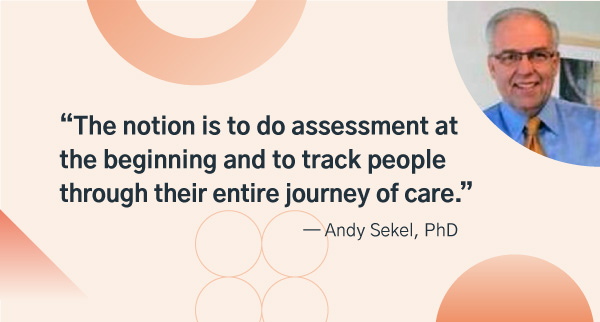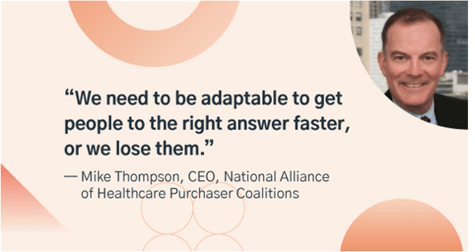
In a recent webinar, Dr. Andy Sekel, Ph.D., Twill's Chairman, discussed the status of the current behavioral health system, and asked a panel of experts what they would do to improve that system.
The video and transcript below are excerpts from that webinar, titled “What Does 'Digital First' Mean for Behavioral Health and Can It Help Avoid The Mistakes of the Past?”
The three panelists who joined Dr. Sekel are all builders of systems that deliver healthcare to large populations of people.
Panelists included Steve Blumenfield, Head of Strategy and Innovation for Willis Towers Watson’s Health & Benefits business in North America; Dr. Stuart Lustig, Cigna’s National Medical Executive for Behavioral Health; and Michael Thompson, the President and CEO of the National Alliance of Healthcare Purchaser Coalitions.
In this excerpt from their discussion, the panelists discuss the importance of assessing patients early and often in order to know what treatments are working and if they are getting better.
The complete webinar is available here.
Webinar Excerpt Transcript
|
Dr. Andy Sekel: This system is a highway that at the front end is choice. We present to you: Would you like a digital solution that's immediate? Are you opposed to that? Or would you really like to see someone in person? And the highway is open to any provider that qualifies. And the notion is, to go back to Michael's comment, the notion is to do assessment at the beginning. If you're appropriate for digital, to present that as an option. And that might take very different forms. You might decide, “Hey, I'll do it at Talkspace as texts,” or you might decide “I'm fine with doing it through software with Twill.” And give assessments on a regular basis so that people are asked through really very simple questions: Are you better? Are you worse? What's happening with you? And then make some decisions about how to guide them. In this system, you track people through their entire journey of care. And we're trying to provide a platform that allows different companies to be involved in it in a way that sets the stage for this kind of journey and not exclude anyone that's at a qualified provider, but include them as part of that journey. But I think the question we really have to answer in the long run—and digital will help to get data—how come this stuff works for a lot of people, but not for some. CBT, for example, is a very good intervention—it works for a majority of people, but it still doesn't work for some. So we have to catch the people that it doesn't work for and make sure that we're providing them an alternative way of getting care. Thoughts about that? Michael Thompson: You know, all of you are probably more clinically knowledgeable than I am, but what I have learned through personal experience and otherwise is that this is an area where heterogeneity is the rule, not the exception, right? You can’t expect one thing is always going to work for every individual, whether that's a CBT digital therapy or a medication. And because of that, we need to be adaptable to try to help people to get to the right answer faster, because you'll lose them if you don't. And literally lose them if you're too callous in that discussion.
|
You can watch the entire webinar here.
You May Also Like:
- An interview with Dr. Sekel: Where Mental Health Still Misses the Mark
- A letter from Twill's CMO: How to Transform Healthcare at Scale
- White Paper: How to drive 40% Digital Activation with Members

 And so in behavioral health, I think understanding what's having an impact, trying to work towards best fit early, get to the right answer faster, is really the way to get them to the best outcome faster, which actually ends up saving money in the long run.
And so in behavioral health, I think understanding what's having an impact, trying to work towards best fit early, get to the right answer faster, is really the way to get them to the best outcome faster, which actually ends up saving money in the long run.
